Introduction
You will notice the inclusion of a new feature in this edition. Instead of adding committee meeting minutes to the website, we are providing a report (not the full minutes) both for the website and FORUM.
We are just about to start the third course for the current year. The first meeting on ‘The Secret Life of the Human Brain’ is scheduled for Monday, 20th April at 10.30am in All Saints Church Hall. Alan Potter will be in touch with course members.
This edition’s articles start with a piece by John Sharp on national identity. This is intended to provoke reactions, so don’t hold back on your comments. Mary Ormsby provides information on a local worthy, and we conclude with a quiz.
The programme for 2022-3 is under active discussion and it promises to be very exciting. Details will appear in the coming weeks as will guidance on renewing membership.
Committee Report
In the past, Committee minutes have been posted on the website. However, this can only be done after they have been approved at the next Committee meeting. This delay (not to mention the somewhat turgid reporting) means that they have not had many readers. We have therefore decided to try a different approach by providing informal reports to be published in FORUM. We hope that you will find them useful and readable
The most recent Committee meeting was held on 31st March. Once again, we used Zoom, which enabled Peter Firth to take part from the Canary Islands. Zoom has proved invaluable over the past two years and we will continue to make use of it in the future, although we have agreed that our next Committee Meeting will be live and ‘three dimensional’.
John Sharp was able to report that membership continues to grow and is now above sixty with twenty members enrolled for Alan Potter’s course on The Human Brain.
The Committee discussed a variety of topics, many of them relating to the programme for this year and next. Details of future events will be found elsewhere in this and future editions of FORUM.
We continue to find new ways to publicise the Society and its work. and a new logo and a PowerPoint introduction to the University Extension Movement were both seen as ways to develop this. So too are contacts with other groups and we looked at ways of working with the U3A in particular. We are also in contact with the Red Cross with the intention of using them to provide some basic first aid training for those members who are interested. We want to make sure that whenever SUES meets, there is someone on hand able to help in an emergency.
Bob Neate, our treasurer, was able to confirm that all is well with our finances but he told us that he is hoping to retire from his role which he has held for 15 years. He has seen the society move firstly from not having enough money to having plenty of money but not enough members and more recently to the enviable position of having an increased membership and a healthy bank balance. His major role in this transformation brought him the thanks of the whole committee. We will be looking to find a new treasurer and, as chairman, Alan would very much welcome any expressions of interest from the membership. Bob is very willing to provide help and support for a smooth changeover.
In addition to a new Treasurer, we would really welcome some new recruits to the Committee. It is not too onerous a role. We have 7 or 8 meetings per year and most of them will continue to be by Zoom. Again, please contact Alan or any other current member of the committee.
Roger Mitchell
Secretary
There’ll Always Be An England
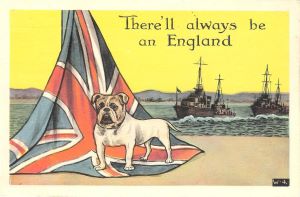
The following thoughts were provoked by Roger Mitchell’s challenge of last year ‘When did England look its best?’ I am sure it was deliberate, but why did he confine us to the southern part of one island (excluding Wales)? Does the concept ‘England’ include all of what we might consider our heritage? The ditty from which the title is taken asks ‘red, white and blue, what does it mean to you?’ and then calls on ‘Britons’, in other words making England = Britain or even the United Kingdom.
The question of national identity is a fascinating one, and we seem to be more confused than most. A Frenchman knows he is French and that he lives in France. But how do you answer the questions, ‘Where do you come from?’, ‘What’s your nationality?’ A lot of people will say ‘I’m English and I come from England’, even though the correct answer is ‘I’m British and I come from the United Kingdom of Great Britain and Northern Ireland.’ Isn’t it strange that our cars are labelled GB and that we have four national football teams?
I remember as a child being confused as to where exactly we lived in South Liverpool. Our address was Mossley Hill, our phone number Garston, the nearby station was West Allerton and Aigburth was just down the road.
So, for the sake of clarity, let’s have a few definitions. Geographically speaking, there is an archipelago off the North West coast of Europe called the British Isles, but I’d be careful about saying that in Dublin! I suppose ‘this sceptred isle’ sounds more poetic than ‘this sceptred archipelago’, although the latter is more accurate. Great Britain is the largest of the islands in this archipelago and it consists of three parts: England, Scotland and Wales. Nearly all the inhabitants of the British Isles speak English as their first language, although so do many other people all over the world, who would hardly call themselves British or English.
Moreover, the sentimental picture of a seamless story of an England with ‘country lanes’ etc. stretching into a distant past doesn’t altogether fit the facts.
The archipelago was known in ancient times; and was called Prethanike by the Greeks, from which we get Britain. The Romans conquered some parts of this rather remote area and called it Britannia. Before the fifth century CE, there wasn’t an Englishman in sight! The people were Celts and Romans. Some of the former later settled in that part of France known as Brittany, Bretons, i.e. Britons. Others became the Welsh or the Cornish. The Romans gave up on Britain in 410 CE, and in the following decades various German invaders arrived. We call them Anglo-Saxons, but there were also Jutes and Frisians. They spoke languages which eventually consolidated into English, but the Kingdom of England was not created until the tenth century. Athelstan is usually regarded as the first King of England, becoming King of the Anglo-Saxons in 924 CE and King of England in 927 CE. Before then there were various separate kingdoms, of which the most successful were Northumbria, Mercia and Wessex. Sometimes one of these was so dominant that its ruler was thought of as having a wider authority, but the title given was Bretwalda, obviously connected with the idea of Britain, not England. Also, by this time the Vikings had arrived to complicate matters, but their language was sufficiently like English for the two speeches to merge, and the English eventually absorbed the Danelaw.
From then on there were Kings of England, though some of them were Danes, until in 1066, when an invader from the continent, William the Conqueror, got himself crowned King of the English. The choice of the term is perhaps significant because he was a French speaker, and that language, or at least the Norman version of it, was the official language of court and aristocracy for some centuries. But English, spoken by the ordinary folk, did not go away, which perhaps shows how resilient it was, and it re-emerged as the main language by about 1400. Think Chaucer.
The country was recognisably England in the later Middle Ages, though it did include Wales, finally conquered by Edward I, but not thereafter mentioned separately. Kings called themselves Kings of England and Lords of Ireland. Sovereignty over Ireland was fairly loose at this time, though expeditions were occasionally sent to maintain order, e.g. Richard II went in person. Scotland, though it had been briefly under English control, again in the reign of Edward I, was an independent kingdom. The monarchs also called themselves Kings of France for a long time, never quite relinquishing the claims of Edward III, even when there was only Calais left under English rule, and even that was lost in the reign of Mary Tudor. Actually, one of the present Queen’s many titles is Duke (sic) of Normandy, though this now only refers to the Channel Islands. Henry VIII added religious titles, such as Defender of the Faith and these were retained by subsequent monarchs.
The next big change was in 1603 when the King of Scotland became also King of England. However, as he is known as James VI and I, this should remind us that this was not a union of the two countries: they just happened to have the same king. It was only in 1707 in the reign of Queen Anne that we had a United Kingdom, created by the Act of Union. This was a deal by which Scotland got access to free trade at the price of accepting Protestant Succession, and this held: many Scots did not support the Jacobite rebellions. Certain local privileges were retained, e.g. Scots law, but Scotland was now represented by MPs in the English Parliament.
A later Act of Union 1800-1 extended the principle to Ireland and again the parliaments were merged. We now had the United Kingdom of Great Britain and Ireland, covering the whole of the British Isles. However, it only lasted until 1922. Governments in Westminster proved to be not particularly good at being fair to Ireland, preferring to support Protestant English landowners against the local Catholic peasantry. Then there was the terrible Potato Famine (1845-50) as a result of which many Irish starved and many emigrated. Attempts to grant Ireland Home Rule, which would at least have preserved the Union, failed because of political opposition, especially from the House of Lords, and the existence of a vociferous Protestant Unionist majority in the North. After the First World War and a bloody civil war, the Irish Free State came into existence in the south of Ireland, and we became the United Kingdom of Great Britain and Northern Ireland.
One wonders if this is the end of the story. There is a strong movement for independence in Scotland and a less powerful one in Wales. In Northern Ireland, as a result of the Brexit protocol, it is possible at least to contemplate the possibility of a United Ireland. However, at least there’ll always be an England, if not a United Kingdom.
The confusion about identity extends to the academic world. Histories of Britain are often about England and histories of England often include Wales, Scotland and Ireland. Even libraries can’t get it right: as you try unsuccessfully to find ‘United Kingdom, history of’. Wikipedia does a have a section on the History of the United Kingdom, but there is, correctly, nothing before 1707.
Not only is it an interesting puzzle to find the terminology for national identity, there is also the question of what it is. What does it mean to be British (or English if you prefer)? How do we recognise our compatriots? Speaking the same language may do for smaller countries, but obviously not for us. Being born in a place also has its limitations, as does simply having a passport. Politicians sometimes grab hold of the populist idea of ‘shared values, but when asked what these are, they usually come with a list of virtues (tolerance, fair play) that are common to many peoples, indeed perhaps the whole of humanity. Is there anything peculiar about us, apart from complaining about the weather and replying ‘mustn’t grumble’ when asked how we are?
Perhaps we should search for our national identity in our culture and traditions, good and bad. We are influenced, perhaps without realising it, by a great literature and a long tradition of placing government under the law. We can be proud of Shakespeare and the rule of law, not to mention institutions such as the BBC and National Health Service, which are specifically British. What makes you feel peculiarly British or English? The National Trust, irony, the invention of cricket, David Attenborough, real ale? Make your own list. You might also consider things that you don’t like about your nation!
Personally I am quite comfortable with being British. My paternal grandfather came from an entirely Scottish background and my paternal grandmother from an entirely Welsh one. My mother’s forebears were 100% English. Like many of my fellow-citizens I am a mongrel.
John Sharp
Ernest Walter Johnson
Architect (1865 – 1936)
Ernest Walter Johnson was the first child of Robert Johnson and his second wife Mary Sidebottom. He was baptised at Trinity Church, North Meols on the 6th March 1853. His father, Robert Johnson, was an established printer and the 1851 census shows the family living at the Visitor Office on Lord Street, Southport.
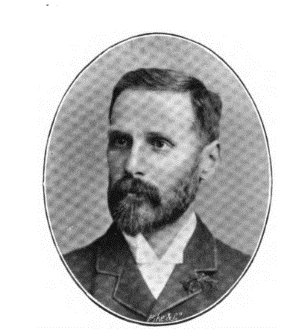
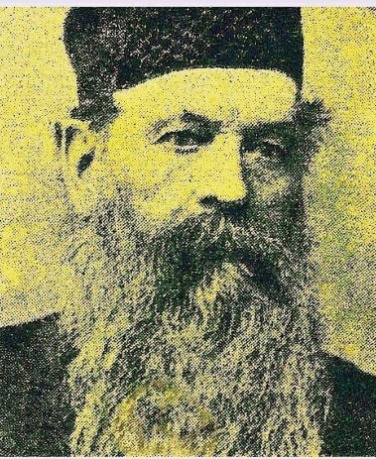
The printing business was obviously a thriving one because in 1861, Robert is listed as employing 16 men and six boys. The company eventually became the Visitor Press. Ernest was educated at Sandringham School in Alexander Road Southport and in 1871, he is listed as an Architect’s Apprentice, a pupil of J Sidebothom of Southport and then Edward Solomons of Manchester. He started in his own practice around 1878.
In September 1880, he married Grace Sagar at St Matthew’s church in Burnley and they lived at 87 Hampton Road Southport. They had four children: Henry Valentine (1882 –?) who was also an architect; Dorothy May (1884 – 1936) who never married and lived with her father until she died; George Sagar (1885 -1924) a marine engineer and Ernest Norman (1895 -1918). He was a soldier in the 1st/ 6th Battalion Welsh Fusiliers and died in Egypt.
Before WW1, Ernest Johnson was one of the best-known architects in Southport and was responsible for many important buildings. He was also President of the Southport Photographic Society and a member of the Freemasons.
Ernest gets no fewer than seven entries in Pevsner, among them are: The Scarisbrick Mausoleum at Crossens, The Victorian School of Science and Art which stood between the Atkinson and Cambridge Hall, three north bays of the Prince of Wales Hotel and the Albany Buildings on Lord Street.
Perhaps he is best remembered as the designer of the memorial in Duke Street Cemetery to the victims of Eliza Fernley Lifeboat disaster of 1886. The lifeboat, Eliza Fernley, was launched from Southport in response to distress signals from a German cargo ship, ‘The Mexico’, which had run aground just off Southport in a violent gale. When the lifeboat reached ‘The Mexico’, she was struck by heavy seas and capsized. Two hours later, she was found approximately three miles from Southport at Birkdale. Fourteen of her sixteen crew had perished.
After retiring from his private architectural practice, Ernest Johnson became surveyor to the Ince Blundell Estate until 1934. He died suddenly at his home, Sandilands, Wicks Lane, Formby, two months after his daughter, Dorothy, died, and was buried in St Luke’s graveyard.
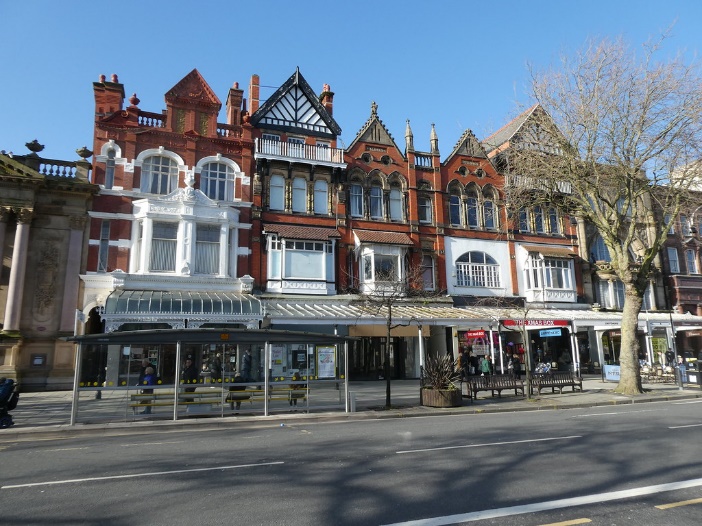
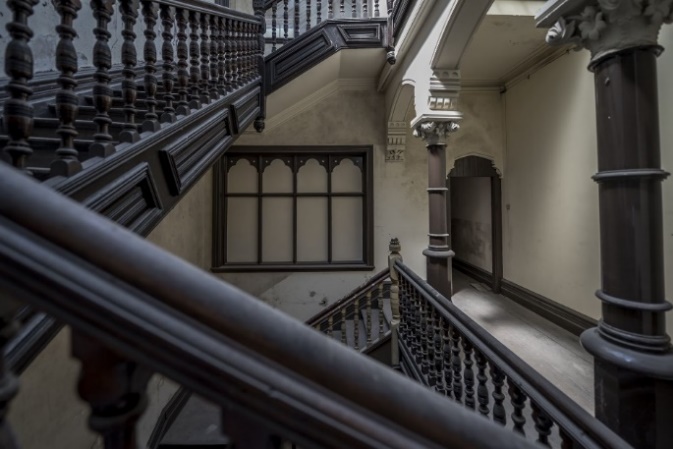
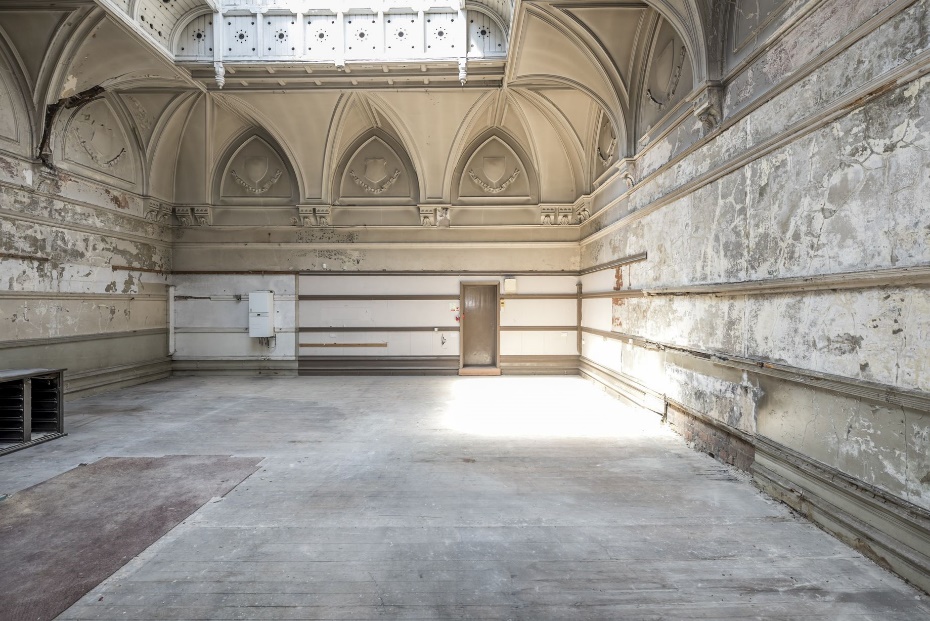
The Albany Buildings
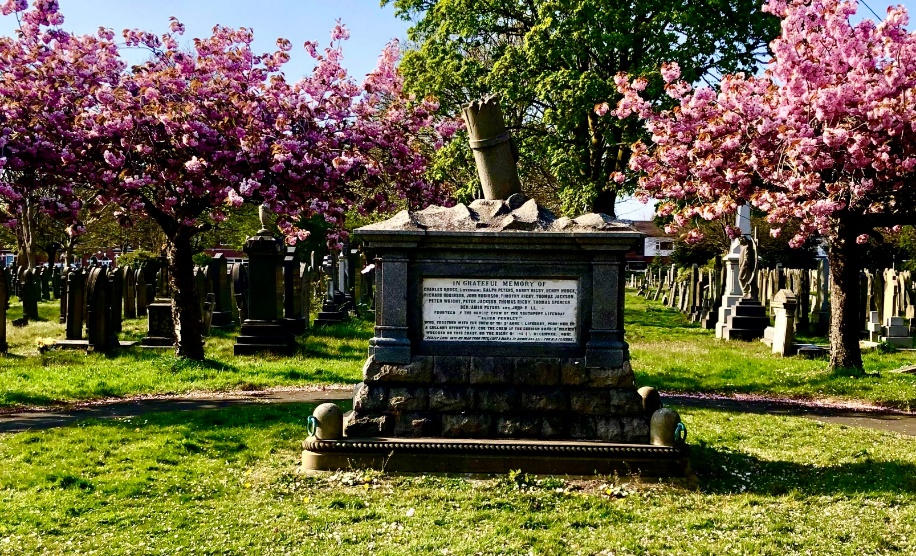
Memorial stone placed over the communal grave of the Eliza Fernley lifeboat crew at Duke St. Cemetery.
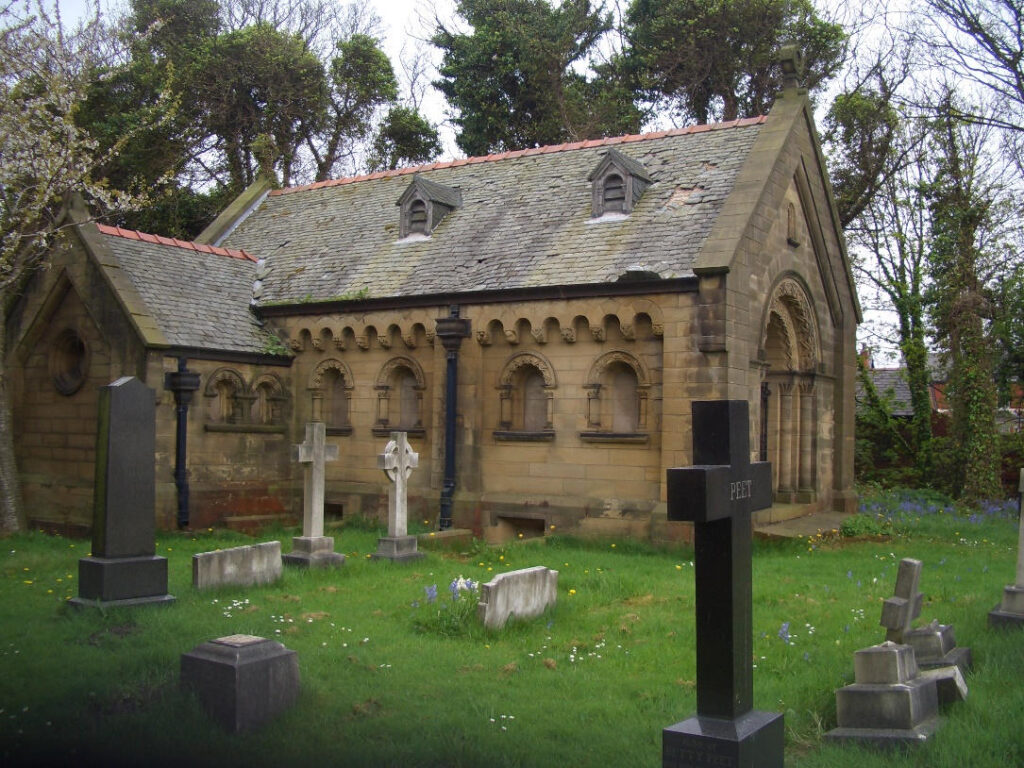
The Scarisbrick Mausoleum at Crossens
Mary Ormsby
SUES Quiz
England and English
If you have identified yourself as English, following John Sharp’s article, (and even if you haven’t) try the following to test out your knowledge. Answers in the next edition.
- Which is England’s longest river?
- In the 14th century, beating the Great Pyramid of Giza, which building in England claimed to be the world’s tallest structure?
- Which is currently the tallest building in England?
- What is the proper/official name of Big Ben?
- What is the main ingredient in a Glamorgan sausage?
- How many English words can you name with “h” following “p” where they are not pronounced with an “f” sound? There are at least six.
- Can you find an English word in which the letters “wkw” appear consecutively?
- Which English word has nine letters with only one vowel?
- Which seven-letter English word does not contain any of the vowels a, e, i, o, u?
- Which English word contains five vowels immediately one after the other?
- What is the origin and meaning of the word ‘quarantine?’
- Which three words in standard English begin with the letters ‘dw’?
Peter Firth
Contacts
Chair: Alan Potter
alanspotter@hotmail.com
07713 428670
Secretary: Roger Mitchell
rg.mitchell@btinternet.com
01695 423594 (Texts preferred to calls)
Membership Secretary: Rob Firth
suesmembers74@gmail.com
01704 535914
Forum Editor: Chris Nelson
chris@niddart.co.uk
07960 117719
Facebook: facebook.com/groups/southportues
See our archive for previous editions of the SUES Forum!